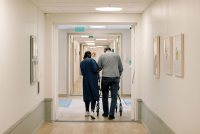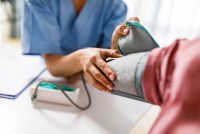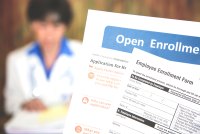Latest KFF Health News Stories
Democratic Hopefuls Fault GOP Incumbents for Anti-Abortion Records in Congress
Democratic congressional hopefuls in California are highlighting the anti-abortion records of vulnerable Republican incumbents, many of whom have moderated their stances ahead of the election. With control of the U.S. House at stake, Democrats hope to convince voters that their candidates will do more to protect women’s health.
A medida que se acerca el día de las elecciones, los aspirantes demócratas están haciendo todo lo posible para vincular a sus oponentes republicanos en distritos congresionales disputados con sus antecedentes antiaborto.
UCSF Favors Pricey Doctoral Program for Nurse-Midwives Amid Maternal Care Crisis
UC-San Francisco is pausing its long-running master’s program in nurse-midwifery and plans to shift to a lengthier, costlier doctoral program. Midwives criticized the move and questioned the university’s motivations at a time of serious shortages of maternal care workers.
El cambio duplicará con creces el costo para los estudiantes. Expertos dicen que aumentará la escasez de estos profesionales de salud.
Public Voices Often Ignored in States’ Opioid Settlement Money Decisions
In many places, victims of the opioid epidemic are silenced in decision-making about how to use opioid settlement money, a first-of-its-kind survey conducted by KFF Health News and Spotlight PA found.
Traveling To Die: The Latest Form of Medical Tourism
Medical aid in death is legal in 10 states and the District of Columbia. But only Oregon and Vermont explicitly allow out-of-state people who are terminally ill to die with assistance there. So far, at least 49 people have made the trek while state legislation stalls elsewhere.
Viajar para morir: la última forma de turismo médico
La muerte asistida sigue siendo un tema controversial. Es un derecho, o no se permite, dependiendo del estado en donde se viva.
Why Millions Are Trying FDA-Authorized Alternatives to Big Pharma’s Weight Loss Drugs
Although Novo Nordisk and Lilly lump together the pharmacies that compound semaglutide and tirzepatide with internet cowboys selling fake drugs, there is a distinction. The FDA has offered Americans little clarity about the vast gray and black markets for the drugs.
Leyes que protegen a trabajadores de California del calor extremo ayudarían a estudiantes
Estas mismas normas se extenderán a las escuelas, donde profesores, conserjes, quienes atienden las cafeterías y otros empleados suelen trabajar sin aire acondicionado, igual que sus alumnos.
Heat Rules for California Workers Would Also Help Keep Schoolchildren Cool
Proposed state standards to protect indoor workers from extreme heat would extend to schools. The rules come as climate change is bringing more frequent and intense heat waves, causing schools nationwide to cancel instruction.
Nursing Homes Wield Pandemic Immunity Laws To Duck Wrongful Death Suits
More than 172,000 nursing home residents died of covid. In lawsuits, some families who lost loved ones say they were misled about safety measures or told that covid wasn’t a danger in their facilities.
Concerns Grow Over Quality of Care as Investor Groups Buy Not-for-Profit Nursing Homes
For-profit groups own more than 70% of U.S. nursing homes. Industry leaders and researchers wonder whether corporations and investors can succeed where not-for-profit organizations have struggled. Or, will quality of care suffer in the name of making money?
More ‘Navigators’ Are Helping Women Travel to Have Abortions
After the U.S. Supreme Court ended the federal right to an abortion and many states banned the procedure, reproductive health care organizations hired dozens of people to help patients arrange travel and pay for care.
Hoping to Clear the Air in Casinos, Workers Seek to Ban Tobacco Smoke
Casinos in several states are fighting efforts to ban smoking, and trying to roll back existing anti-smoking laws. One planned facility even moved outside a city’s limits because of voter-approved smoking restrictions.
States Expand Health Coverage for Immigrants as GOP Hits Biden Over Border Crossings
More than 1 million immigrants, most lacking permanent legal status, are covered by state health programs. Several states, including GOP-led Utah, will soon add or expand such coverage.
La mayoría de los adultos sin papeles trabajan, representan aproximadamente el 5% de la fuerza laboral nacional, según el Pew Research Center.
Deep Flaws in FDA Oversight of Medical Devices, and Patient Harm, Exposed in Lawsuits and Records
Thousands of medical devices are sold, and even implanted, with no safety tests.
Candidates Clashed But Avoided Talk of Abortion at 4th GOP Primary Debate
Obamacare had its moment, but not until the faceoff’s final minutes. Front-runner Donald Trump again was not on the debate stage, leaving the other Republican presidential hopefuls to slug it out to break through and gain voters’ attention.
‘Forever Chemicals’ Found in Freshwater Fish, Yet Most States Don’t Warn Residents
At least 17 states have issued PFAS-related fish consumption advisories, KFF Health News found. But with no federal guidance, what is considered safe to eat varies significantly among states, most of which provide no regulation.
Start Shopping: Enrollment Begins Nov. 1 for Most Obamacare Insurance Plans
More than 16 million Americans who buy their own health insurance through state and federal marketplaces have until Jan. 15 to compare prices, change their coverage, or enroll for the first time.





















